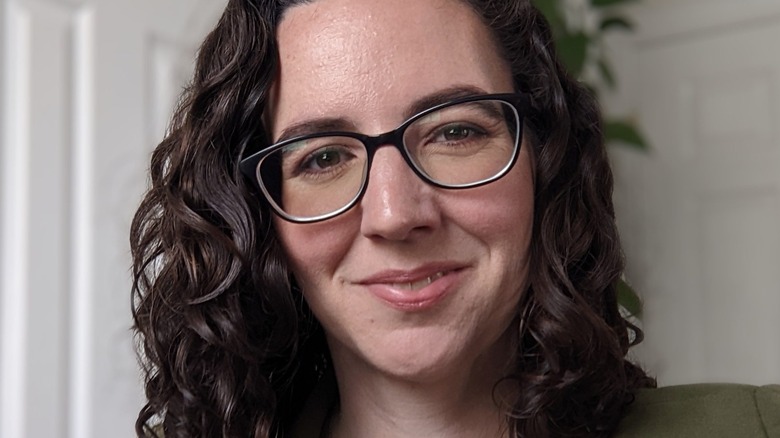Food Historian Carla Cevasco On What History Can Teach Us About The Infant Formula Shortage - Exclusive Interview
Carla Cevasco is literally writing the book on how Americans parents have historically fed their infants and children. As an American Studies professor at Rutgers, Cevasco has focused her entire career on the history of food, hunger, and bodies in early America. Her upcoming book reveals the struggles early American mothers experienced with nourishing their children — struggles that, unfortunately, mirror our current circumstances a little too much.
Cevasco's research for the book has given her a unique perspective on the current infant formula shortage, the impact it's having on American families, and why breastfeeding isn't the solution for all American parents. In this exclusive interview with Health Digest, Cevasco explained why breastfeeding has always been an unreliable source of nourishment for newborns and infants, as well as how the development of safe and nourishing baby formula has literally saved lives, and what early American history can teach us about how to feed our children now.
Infant hunger has always been a problem in America
Can you tell us a little about your research into the history of food in America?
I'm a historian of food in early America. My first book is about how colonial and Indigenous peoples grappled with hunger in the 17th and 18th centuries. My second book, which is in progress, is a history of feeding infants and children in the U.S.
How can studying the history of food and our food systems inform our present-day problems with hunger?
A very important idea in the U.S.'s vision of itself is that America has always been a "land of plenty." This mythology obscures the fact that people have always faced hunger in the U.S, including the families impacted by the formula shortage right now. We have to acknowledge the reality of hunger in order to work to solve it. This also means acknowledging the relationship between hunger, race, and class, which has deep, deep roots in American history.
The book you're working on right now focuses specifically on how early Americans fed their infants and babies. What have you learned while researching that book that contextualizes current struggles with feeding infants and babies, like the infant formula shortage?
Throughout history, some people have always struggled to breastfeed, and families have always needed alternative foods to feed infants. Before the 20th century, before current food safety standards or understandings of nutrition, these foods were not necessarily safe or sufficient for healthy development, and infant mortality rates were much higher than they are today. So, access to modern formula has saved infants' lives.
A lot of the discussion around the infant formula shortage focuses on how parents can just breastfeed. What does this argument miss?
There are a lot of reasons why people may be unable to breastfeed. Maybe mom is physically unable to do it, or doesn't produce enough milk, or needs to take a medication that is not safe for breastfeeding. Maybe mom just doesn't want to breastfeed! Maybe the infant has trouble latching because they are a preemie or have tongue-tie or other challenges.
A major issue in the United States is lack of paid parental leave for many workers. Breastfeeding or pumping is time-intensive, and a lot of families struggle to balance that time with returning to the workforce. As a result, breastfeeding rates are highest among wealthy white families, who have disproportionate access to paid leave or can afford a parent to leave the workforce entirely while nursing. Working class people do not have access to the same kinds of support and are more dependent on formula as a result.
There have always been alternatives to breastmilk, but they weren't always safe
Today we can rely on the expertise of lactation consultants to learn how to breastfeed or troubleshoot issues. How did early American parents learn how to breastfeed and resolve those issues?
Many cultures have traditions of caring for new parents in the days or weeks after birth. In early modern Europe, and among European colonists in America in the seventeenth and eighteenth centuries, birth was a communal event, with a midwife and friends, neighbors, or relatives in attendance in what was called the "lying in chamber," the room where birth took place.
After birth, this community of women would support the mother and baby, including offering breastfeeding instruction, or sometimes nursing the baby themselves if needed. In this kind of community, there was a lot of knowledge about and experience with breastfeeding. Nevertheless, we know that people still faced challenges. Medicinal recipe books from this period include remedies for sore nipples, and museum collections like the Wellcome Collection have nipple shields made of wood, silver, glass, and other materials.
What did parents do before the development of formula when they had problems breastfeeding?
Parents would try to find an alternative source of breastmilk. Before modern pumps and refrigeration, it was basically impossible to store breastmilk, so babies really needed access to a lactating person. This might be a friend, neighbor, or relative on an informal basis. Wealthier families could afford a wet nurse, either a paid servant or an enslaved person. Wet nursing was often really tragic and exploitative, because wet nurses either had already lost their own infants or had to nurse their employers' children at the expense of their own.
If someone else couldn't nurse the baby, then parents turned to alternative foods. In the 17th and 18th centuries, these would be soft or liquid foods made of animal milk, broth, or grains; some Native American recipes were made from nuts and corn. While babies could thrive on these diets, many did not. Alternative foods were often contaminated with pathogens or nutritionally incomplete; many babies died of malnutrition or of digestive illnesses like diarrhea.
By the turn of the 20th century, chemists and industrial food producers had begun to develop mass-produced alternative baby foods. The availability of these foods (which were marketed to new parents as scientific and modern) combined with increasing numbers of women entering the workforce outside the home, and pediatricians starting to emphasize scheduled feeding and other practices that were actually detrimental to successful breastfeeding — all of these factors led to a huge decline in breastfeeding, which did not reverse until the end of the 20th century.
Can any of these strategies help parents dealing with the current formula shortage?
Parents who have questions about what to feed their babies due to the formula shortage should consult their pediatrician about what to do. They should not be making formula at home from recipes found on social media.
Infant formula can saves lives
How did the development of infant formula in the mid-20th century fundamentally change the way Americans feed their children?
It's not until the 20th century that modern formula is developed in accordance with modern nutrition and food safety standards. We should not take formula for granted. It's only fairly recently in human history that families have been able to rely on an alternative to breastmilk that is safe and nutritionally complete. That is a real game-changer. It's why the formula shortage is so frightening. We do not want to return to the pre-formula past, when infant mortality rates were high.
What impact did the development of formula have on rates of breastfeeding?
By the mid-20th century, breastfeeding rates in the U.S. hit record lows. The vast majority of babies were fed either homemade or commercially produced formula, which was really aggressively marketed to parents and pediatricians.
How have the pediatric recommendations around breastfeeding and formula feeding changed since the development of formula?
Since the late 20th century, there has been a swing back toward support for breastfeeding among public health authorities and pediatricians. Now, a majority of American infants start out breastfeeding, but only very few are exclusively breastfeeding at six months as is recommended, in part due to the lack of societal support for new parents, such as universal paid family leave and other policies.
Why do you think the decision to breastfeed or formula feed has become so moralized?
One of the reasons that I study the history of food is because food is so powerful. We need [it] to survive on a biological level, but we also attach cultural meanings and values to food. Baby food is one example of that.
Societal anxieties and pressures about infant feeding are not unique to the 21st century. In the late 18th century, for example, the British empire was trying to go out and colonize the whole world, and imperial authorities realized that they needed to be producing a lot of British babies to accomplish that. They launched a big campaign for mothers to breastfeed their own babies, rather than wet nursing or feeding them other foods, in an effort to reduce infant mortality.
What can today's parents learn about feeding their children from early American parents?
A constant theme in my research is that people have always agonized about what to feed their children. Today's parents are lucky that they have multiple safe options for feeding infants, unlike parents in the past.
For more insight into Cevasco's work, visit https://carlacevasco.com/



